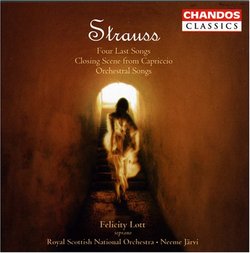| All Artists: Richard [1] Strauss, Neeme Järvi, Royal Scottish National Orchestra, Felicity Lott Title: Strauss: Four Last Songs; Closing Scene from Capriccio; Orchestral Songs Members Wishing: 0 Total Copies: 0 Label: Chandos Release Date: 5/20/2003 Genres: Pop, Classical Styles: Vocal Pop, Opera & Classical Vocal Number of Discs: 1 SwapaCD Credits: 1 UPC: 095115107522 |
Search - Richard [1] Strauss, Neeme Järvi, Royal Scottish National Orchestra :: Strauss: Four Last Songs; Closing Scene from Capriccio; Orchestral Songs
 | Richard [1] Strauss, Neeme Järvi, Royal Scottish National Orchestra Strauss: Four Last Songs; Closing Scene from Capriccio; Orchestral Songs Genres: Pop, Classical
|
Larger Image |
CD Details |
CD ReviewsPitching Problems AD Van Breda | South Africa | 01/02/2010 (3 out of 5 stars) "I love Strauss' songs, and of course the four last songs are exquisite. I like Lott's voice and agree with other reviewers of this recording that she does a lovely job. But there are numerous places where she is slightly sharp, sending shivers down my spine. If you are a first time buyer of this work, go for Gundula Janowitz or Soile Isokosi or Elisabeth Schwarzkopf or Jessye Norman." Soaring Unfettered Leslie Richford | Selsingen, Lower Saxony | 02/01/2009 (5 out of 5 stars) "Richard Strauss (1864 - 1949): Vier letzte Lieder [Four Last Songs]; Closing Scene from "Capriccio"; 8 Orchestral Songs. Performed by Dame Felicity Lott, soprano, and the Royal Scottish National Orchestra, directed by Neeme Järvi. Recorded in 1986, 1988 and 1992 in Dundee and Glasgow, Scotland. This compilation published in 2003 as Chandos 10075. Total playing time: 69'30".
As an early music fan, it took me a little while to adjust to Richard Strauss's style, but once I had attuned my ears to these sounds, I quickly came to the conclusion that this was probably an ideal interpretation. Felicity Lott's superb soprano stands in the center of attention here, and deservedly so, for it is not merely the soul, but also her voice which soars unfettered, adding the sometimes mystical, sometimes wistful dimension to the German texts which Strauss obviously intended. The accompaniment by the Scottish orchestra is luscious without ever dominating, Neeme Järvi here adds another feather to his cap with a well-rounded performance that it will be difficult to top. I bought this disc after seeing it recommended in BBC Music Magazine (having been somewhat unsatisfied with Elizabeth Schwarzkopf's fifties' version). Certainly no disappointment here! Strauss was a fascinating personality and composer, and Chandos here provide relatively easy access to some of his most charming songs. The well-printed booklet includes all texts with translations which, although not always strictly literal, do accurately reflect the meaning of the poetical German texts." |

 Track Listings (14) - Disc #1
Track Listings (14) - Disc #1